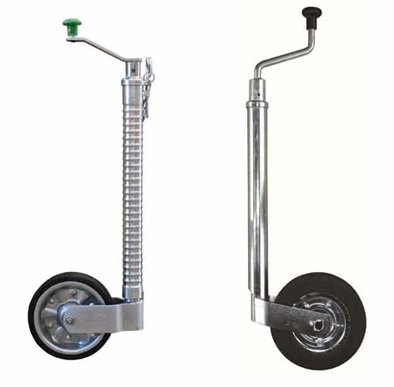Jockey wheels are an incredibly essential component of a trailer but are frequently ignored. Due to their importance it is important to choose the right size to suit your vehicle. A jockey wheel’s objective is to keep the trailer straight and balanced when it is unhitched and to keep it steady while the trailer is being packed. Jockey wheels also reduce the pressure on your back, as they also improve the trailer ‘s stability.
Smooth or serrated jockey wheel?

When selecting a jockey wheel, this is one of the first question you may come across. But what will be the difference? In reality, the smooth jockey wheels are the most common options, and are the standard that are used for light and commercial duty trailers. A smooth jockey wheel has one drawback: when the clamp is not fixed firmly enough, it can lead to the shaft sliding through the clamp – meaning it will hit the road during the journey. This could possibly result in a severely damaged tyre and the potential requirement of replacing the entire assembly.
In comparison, the serrated jockey wheel has a ribbed outer sleeve. Commonly used on commercial heavy-duty vehicles with a diameter of 48 mm or greater. A downside to the serrated jockey wheel is that they need a clamp which matches the outer sleeve ‘s exact ribbing. However, ribbing avoids the problem of slipping the shaft through the lock.
What is a retractable jockey wheel?

On your hunt for a jockey wheel, the next question you may encounter is what is a retractable jockey wheel? What are the main differences, between a retractable jockey wheel and one that is not? At an overview, a retractable jockey wheel removes the need to use a clamp to address that briefly. The retractable jockey wheel, in place, bolts directly on the trailer side.
What do the different sizes mean?
Another thing to remember is how your jockey wheels are shaped. There are 2 measurements to be taken into account. Most significant, is the jockey wheel’s diameter. With ATE, you’ll find we stock six different diameter variations. The Serrated 35 mm, 42 mm, 48 mm, 60 mm, and 63 mm.
The jockey wheels of 60 and 63 mm in diameter are the least conventional, with a range of up to 750 kg nose weight. The width is most important when choosing a jockey wheel where the clamp on the full coupling is part of the moulding, as this can not be changed.
The second size to consider is the open and closed height. These are only available on adjustable height jockey wheels. Despite being less important, it helps understanding what range of list is available between these two heights.
Conclusion
There are a number of things to consider when selecting a jockey wheel; what sort of tailer is it being applied to, what diameter do you either, need a smooth or tight jockey wheel, and whether or not a retractable jockey wheel would be an acceptable option. Bear in mind that if you end up selecting a retractable jockey wheel, you need to make sure that there is not a clamp on the wheel already. In place, there is a multi-hole fixing plate, where it can be attached.
